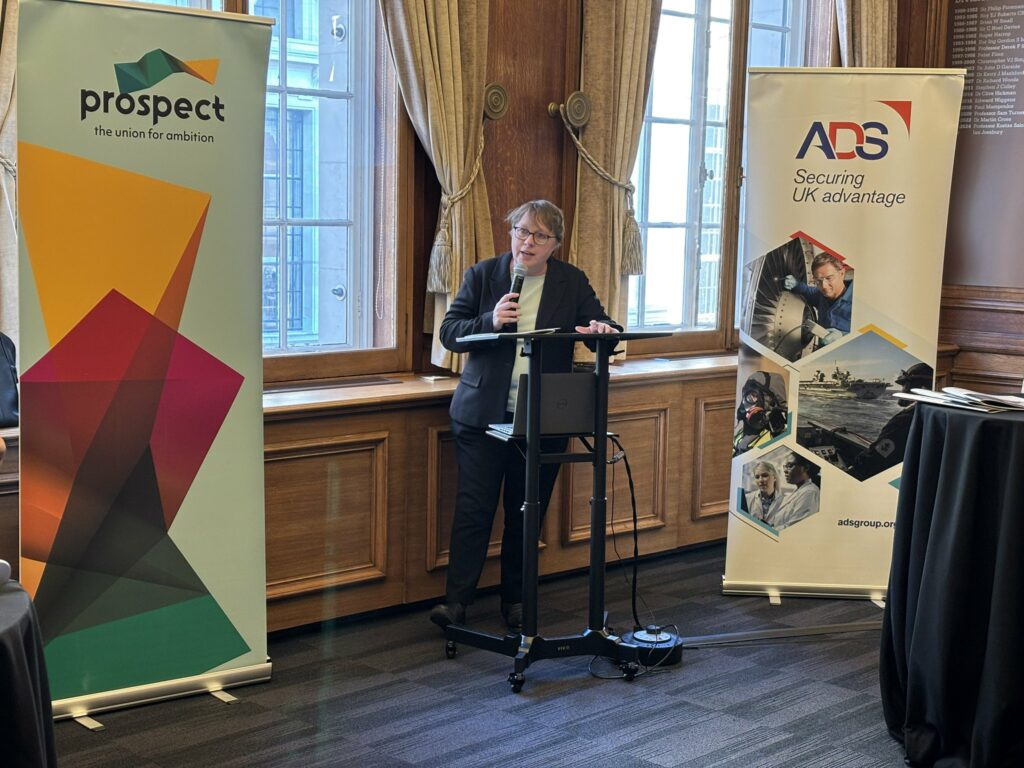New growth plan for Defence warns sector is ‘disproportionately affected’ by skills shortages
A plan to help boost growth in the defence and aerospace sectors has been published in a joint report from the ADS trade association in partnership with Prospect and GMB unions.

Defence Minister Maria Eagle MP speaking at the launch of the report
The joint report, ‘Securing our Future, Together’, sees the three parties make several key recommendations for how the UK government can support these sectors through international partnerships, procurement reform and long-term investment.
It is hoped that the report will inform and influence the government’s Defence Industrial Strategy and Strategic Defence Review, which are both thought to be imminent.
However, as well as the key recommendations, the report also warns that defence and aerospace are ‘disproportionately affected’ by skills shortages and that ‘this is an unsustainable situation in our increasingly uncertain world’.
ADS is a trade association for the UK’s aerospace, defence, security and space sectors, which directly employs nearly 430,000 workers.
The report, which is the product of several months’ collaboration between ADS, Prospect and GMB, was launched at an event in central London on Tuesday, 13 May, and attended by Maria Eagle MP, Minister for Defence Procurement and Industry.
There are six key policy recommendation areas:
- Fostering British Industry: Ensure secure supply chains, establish Centres of Excellence (CoEs), and incentivise co-investment with international partners to retain intellectual property and expertise.
- Delivering for the UK with International Partnerships: Expand skills-sharing initiatives, protect workers’ rights, and safeguard intellectual property.
- Exports and the Growth Mission: Provide tailored SME support, reduce regulatory burdens, and foster cross-government coherence.
- Procurement: Incentivise social value in MoD procurement, enhance government understanding of the sectors, and incorporate exportability early in procurement processes.
- Long-Term Investment: Commit to sustainable funding models to support critical skills and manufacturing.
- Skills for the Future: Develop localised skills mapping, reform the Apprenticeship Levy, promote STEM outreach, and lower entry barriers for apprenticeships.
Defence Minister Maria Eagle MP said:
“Without the UK defence industry we can’t put warships to sea, aircraft in the air, and satellites in space.
“This report underlines the vital role they play in helping drive defence as an engine for UK economic growth – backing jobs, skills and growth in every nation and region.
“Our upcoming Defence Industrial Strategy has been developed in partnership with industry, and we are fully focused on maximising MOD procurement activity for employees, businesses and our troops on the frontline.”
Mike Clancy, Prospect General Secretary, said:
“Investment in this sector is a win-win for security and the economy if we get it right. It has the potential to support good reliable jobs across the country while also safe-guarding our nation’s future.
“Unions and industry are united in their desire to make this extra money deliver on growth as well as security. This is an area of the economy other sectors can learn from, with employers and their workforce joining forces for their mutual benefit and that of the country as a whole.”
The full report is available on the ADS website.

